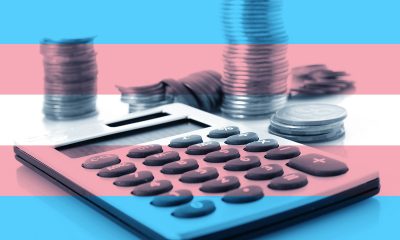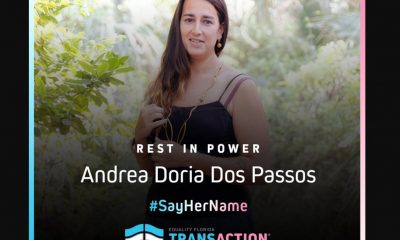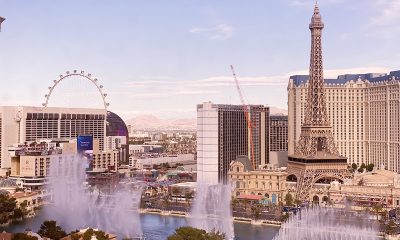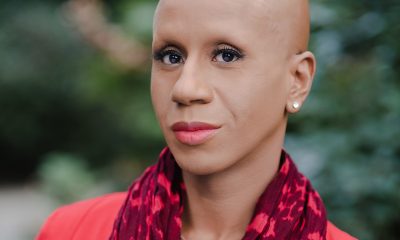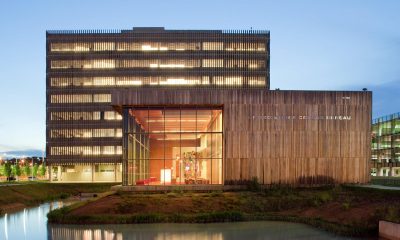World
Honduras government institutions ‘are murdering us’
Lack of opportunities, violence prompt LGBTQ people to migrate
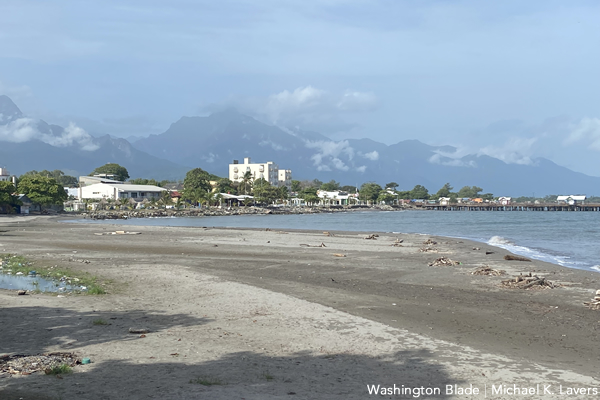
Editor’s note: International News Editor Michael K. Lavers was on assignment for the Washington Blade in Honduras, El Salvador and Mexico from July 11-25.
LA CEIBA, Honduras — Leonela and Jerlín, her partner of 11 years, and their school-age daughter live in La Ceiba, a city on Honduras’ Caribbean coast.
Jerlín was a bus driver in San Pedro Sula, the country’s commercial capital, until gang members shot him three times in 2012 because he couldn’t pay the extortion money from which they demanded from him each month. Jerlín, Leonela and their daughter subsequently fled to La Ceiba, which is about three hours east of San Pedro Sula.
“We left,” Jerlín told the Washington Blade on July 20 during an interview at the offices of Organización Pro Unión Ceibeña (Oprouce), a La Ceiba-based advocacy group. “We fled from there.”
Jerlín migrated to Mexico in January 2019, but returned to Honduras less than a month later because Leonela was in the hospital. The couple and their daughter migrated to Mexico a year later.
Leonela asked for a Mexican humanitarian visa for her and her daughter once they arrived in Ciudad Hidalgo, a Mexican border city that is across the Suchiate River from Tecún Umán, Guatemala.
Leonela told the Blade that she planned to ask for asylum in Mexico and wanted to go to Tuxtla Gutiérrez, the capital of Mexico’s Chiapas state, to find work. Leonela said she and Jerlín instead decided to return to Honduras because they did not want their daughter to further endure the “inhumane” conditions of the migrant detention center in Tapachula, a city that is roughly 20 miles northwest of Ciudad Hidalgo, in which they were living.
“We decided it was better to allow them to deport us,” said Jerlín.
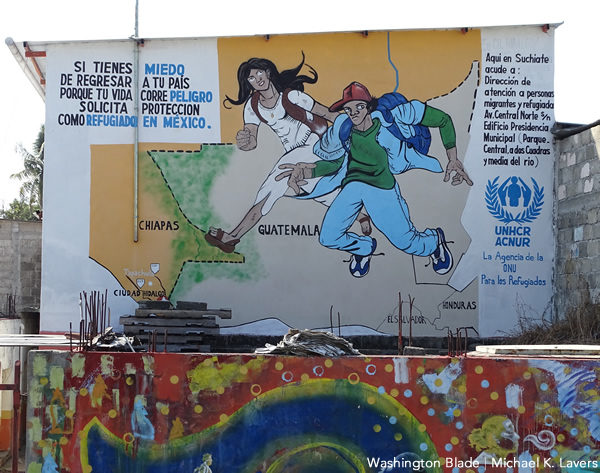
Jerlín, Leonela and their daughter returned to Honduras in May 2020. Someone shot at their house on July 10, 2020.
“They couldn’t even do what people wanted them to do, perhaps even buring us alive,” said Leonela.
Leonela and Jerlín are among the many LGBTQ Hondurans who have decided to leave Honduras in order to escape violence and discrimination based on sexual orientation and gender identity.
Vice President Kamala Harris and other Biden administration officials have acknowledged anti-LGBTQ violence is one of the “root causes” of migration from Honduras and neighboring Guatemala and El Salvador.
Title 42, a Centers for Disease Control and Prevention rule that closed the Southern border to most asylum seekers and migrants because of the coronavirus pandemic, remains in place. The White House has repeatedly told migrants not to travel to the U.S.
Roxsana Hernández, a trans Honduran woman with HIV, died at a New Mexico hospital on May 25, 2018, while in U.S. Immigration and Customs Enforcement custody.
Natasha, another trans Honduran woman, arrived in Matamoros, a Mexican border city that is across the Rio Grande from Brownsville, Texas, on Oct. 12, 2019. The previous administration forced her to pursue her U.S. asylum case in Mexico under its Migrant Protection Protocols. (The U.S. Supreme Court on Tuesday ordered the Biden administration to reinstate MPP.)
The Blade interviewed Natasha on Feb. 27 at a Matamoros shelter that Rainbow Bridge Asylum Seekers, a program for LGBTQ asylum seekers and migrants that Resource Center Matamoros, a group that provides assistance to asylum seekers and migrants in the Mexican border city, helped create. The U.S. less than two weeks later allowed Natasha to enter the country.
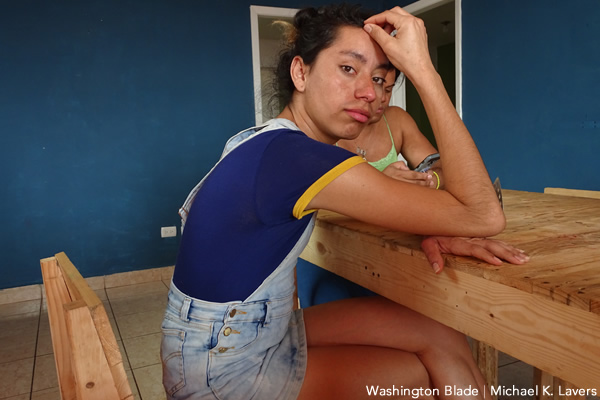
Oprouce Executive Director Sasha Rodríguez, who is trans, has participated in the State Department’s International Visitor Leadership Program.
She said a lack of employment and housing associated with the pandemic has prompted more Hondurans to migrate to the U.S., Mexico and Costa Rica. Rodríguez also told the Blade the U.S. and “our countries sell an American dream that doesn’t exist.”
“Why don’t these American organizations say don’t go,” she said, specifically referring to trans people who have decided to leave Honduras. “Here they see it as beautiful. They are already in the United States, but they were raped while trying to get there. They were kidnapped.”
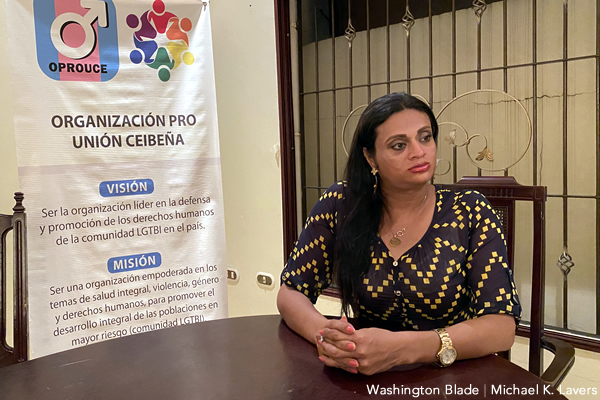
Alexa, a 27-year-old trans woman from La Ceiba, told the Blade she has friends who live in Mexico. Alexa said she would like to leave Honduras, but she doesn’t want to leave her mother alone.
“I don’t want to leave her alone and abandon her because I have always fought for her,” Alexa told the Blade during an interview at Oprouce. “She supports me as a woman.”
Alexa said she served a nearly 3-year prison sentence for attempted murder, even though she was defending herself against a woman who was hitting her in the face with a rock. Alexa began to sob when she started to tell the Blade about the Salvadoran man who raped her in prison. She said the warden then forced her to cut her hair and guards doused her with “ice cold water” in an isolation cell.
“I was a woman,” said Alexa. “They made me a man.”
Alexa told the Blade that other prisoners tried to kill her. She said she also tried to die by suicide several times until her release on Jan. 27.
Alexa said she has not been able to find a job since she left prison. She also told the Blade that gang members continue to threaten her.
“It is sometimes very difficult to lead the lifestyle that we lead as trans women in Honduras,” she said, referring to anti-trans discrimination and a lack of employment opportunities.
Venus, a 30-year-old trans woman who is also from La Ceiba, echoed Alexa.
“To be a trans person is synonymous with teasing, harassment, violence and even death,” Venus told the Blade at Oprouce.
Venus said Honduran soldiers regularly attack trans women. She told the Blade a lack of access to health care, machismo and patriarchal attitudes are among the myriad other issues that she and other trans Hondurans face.
“We don’t have access to education, to health (care), to a job,” said Venus. “Above all we are fighting for a gender-based law that recognizes us as women and men.”
Venus added she, like Alexa, would leave Honduras “if I was given the opportunity to do so.”
Landmark ruling finds Honduras responsible for trans woman’s murder
Red Lésbica Cattrachas, a lesbian feminist human rights group based in Tegucigalpa, the Honduran capital, notes 373 LGBTQ Hondurans were reported killed in the country between 2009-2020.
Statistics indicate 119 of those murdered were trans. Red Lésbica Cattrachas also noted 18 of the LGBTQ Hondurans who were reported killed were in Atlántida department in which La Ceiba is located.
Vicky Hernández was a trans activist and sex worker with HIV who worked with Colectivo Unidad Color Rosa, a San Pedro Sula-based advocacy group.
Hernández’s body was found in a San Pedro Sula street on June 29, 2009, hours after the coup that ousted then-President Manuel Zelaya from power. Hernández and two other trans women the night before ran away from police officers who tried to arrest them because they were violating a curfew.
The Inter-American Court of Human Rights in June issued a landmark ruling that found Honduras responsible for Hernández’s murder.
The ruling ordered Honduras to pay reparations to Hernández’s family and enact laws that protect LGBTQ people from violence and discrimination. The government of President Juan Orlando Hernández, whose brother, former Congressman Juan Antonio “Tony” Hernández, is serving a life sentence in the U.S. after a federal jury convicted him of trafficking tons of cocaine into the country, has not publicly responded to the ruling.
Rodríguez noted to the Blade that Oprouce and other advocacy groups have been fighting for a trans rights law in Honduras for more than a decade.
“We have had failure for 11 years, but I think that with what happened with the Inter-American Court, the recommendations that have come from the Vicky Hernández case could achieve something important,” said Rodríguez. “There are very good human rights recommendations for Honduras and there are good recommendations that Honduras could automatically apply to trans women.”
Rodríguez as she discussed the ruling reiterated trans Hondurans continue to face violence, discrimination and a lack of employment opportunities. Rodríguez also reiterated her sharp criticism of her country’s government and its institutions.
“Societal exclusion forces us to do sex work,” she said. “We are being harmed by our trade: Murder, persecution, hate crimes, torture, beatings.”
“I always say that it is an institutional death because state institutions are murdering us,” added Rodríguez.
‘My fight is here’
In spite of these challenges, Rodríguez said there has been progress.
Oprouce — which works on a variety of issues that include the prevention of gender-based violence and fighting HIV/AIDS — offers workshops to the Public Ministry, the Honduran Armed Forces and judges. Asociación de Prevención y Educación en Salud, Sexualidad, Sida y Derechos Humanos (Aprest), another advocacy group in Tela, a city that is about 60 miles west of La Ceiba, conducts similar trainings with local and national authorities.
Aprest Executive Director Leonel Barahona Medina told the Blade during an interview at a beachfront restaurant in Tela on July 20 that city officials have given him an office from which he and his colleagues can work. Barahona said they also supported activists who raised the Pride flag on June 27 in front of Tela City Hall.
A similar ceremony took place in a park in the center of La Ceiba.
“We have good relations with them,” said Barahona, referring to Tela officials.
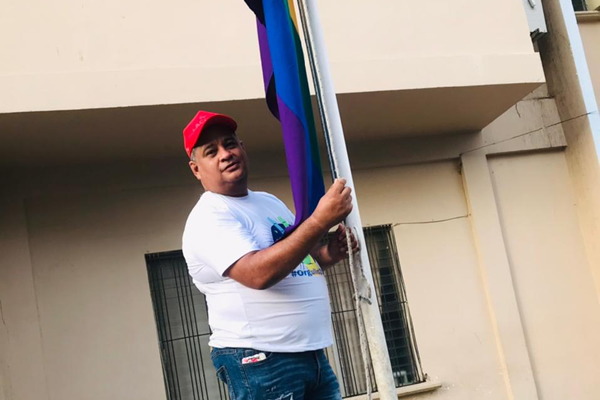
Both Barahona and Rodríguez said their work will continue.
“My fight is here,” said Rodríguez. “My essence and my dreams are here.”
Abdiel Echevarría-Caban and Reportar sin Miedo contributed to this story.
Russia
Vladimir Putin takes office for fifth term as Russia’s president
Kremlin’s crackdown on LGBTQ people expected to continue
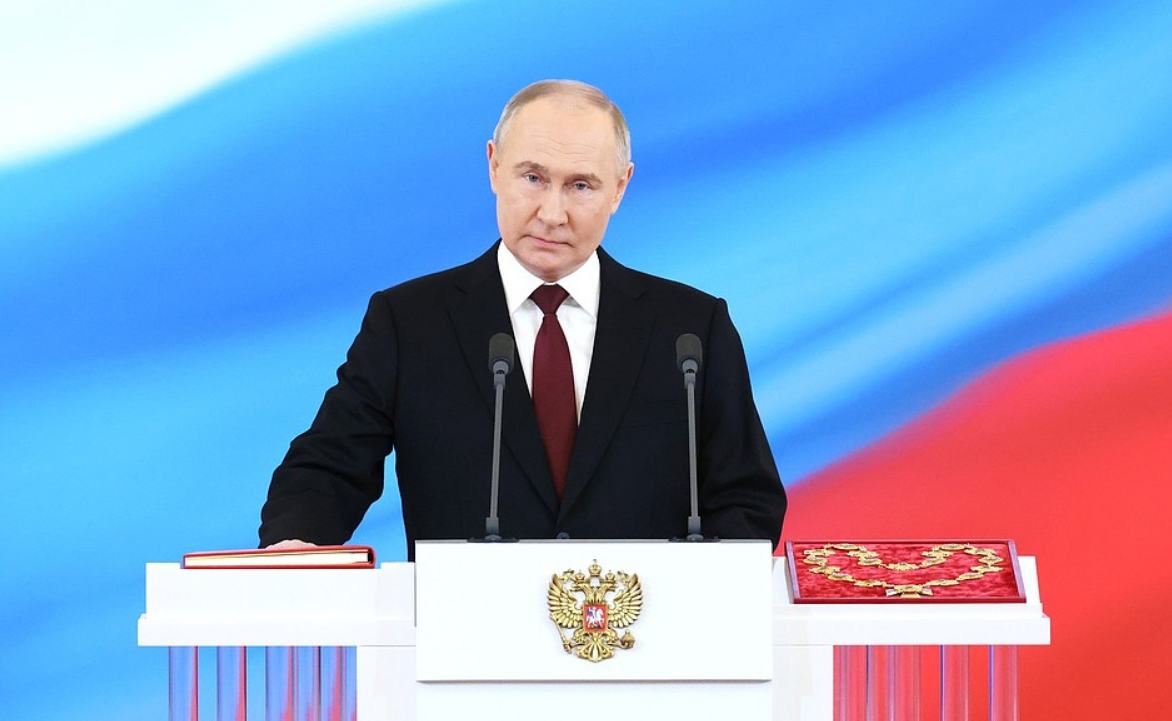
On Tuesday, Vladimir Putin took his oath of office becoming the second ever longest serving leader of the modern Russian state since Soviet dictator Joseph Stalin, who held power from 1922 until his death in 1953.
Putin’s tenure in office has been marked by his acquisition of concentrated political power in part due to his eradication and imprisonment or the deaths of his political opponents, such as his rumored unproven involvement in the assassination of fierce Putin critic Boris Nemtsov on Feb. 27, 2015, just steps away from the gate to the Kremlin, and more recently in the prosecution and imprisonment of another high profile Putin critic, Alexei Navalny, who died on Feb. 16 at a penal colony north of the Arctic Circle.
Putin ordered military operations in August 2008, which led to the Russo-Georgian War and diplomatic relations were broken. To this day, the two countries have maintained no formal diplomatic relations. Then in February and March 2014, Russian troops at his direction invaded the Crimean Peninsula, part of Ukraine, and annexed it. The resulting hostilities also spread to the far-eastern Ukrainian oblasts, [provinces] which culminated with Russia invading Ukraine on Feb. 24, 2022, an escalation of the Russo-Ukrainian War that started in 2014. The invasion became the largest attack on a European country since the end of World War II in 1945.
As the war drags on Putin’s threats of military escalation against NATO countries and use of battlefield nuclear weapons has created a tense relationship with a majority of the European Union as well as with the United States. Russia has been heavily sanctioned by the West and is turning to other totalitarian regimes like China, Iran, and North Korea for support.
In his inaugural speech Putin made oblique reference to his oft stated desire to recreate a hybrid of the former Soviet Union:
“In these solemn and crucial moments of assuming the office of the president, I would like to extend my heartfelt gratitude to the citizens of Russia across all regions of our country, as well as those living in the historical territories of Russia who have won their right to stand united with our Motherland.”
The Russian president then thanked the forces fighting in the invasion of Ukraine saying:
“I humbly honor our heroes, the participants in the special military operation, and all those who are fighting for our Fatherland. I would like to thank you again for the trust you have placed in me and for your unwavering support. These words are directed to every citizen of Russia.”
On the domestic front Putin has stifled media outlets with draconian laws passed designed to keep the Russian population largely ignorant of the cost both human lives and governmental spending as the warfare in Ukraine drags on and losses to the Russian military continue.
The Associated Press reported neither the U.S., U.K. nor German ambassadors attended. The U.S. Embassy said Amb. Lynne Tracy was out of the country on “prescheduled, personal travel.”
A handful of EU envoys attended even though top EU diplomat Josep Borrell said he told them “the right thing to do is not to attend this inauguration,” because Putin is the subject of an arrest warrant by the International Criminal Court for war crimes, accusing him of personal responsibility for the abductions of children from Ukraine.
In his speech Putin issued a veiled threat to critics of his regime that dissention would not be tolerated:
“We can see that the atmosphere in society has changed, and how much we now value reliability, responsibility, sincerity, integrity, generosity, and courage. I will do everything in my power to ensure that those who have displayed these admirable human and professional traits, and who have proved their loyalty to the fatherland through their deeds, achieve leading positions in state governance, the economy and all other spheres.
We must ensure reliable continuity in the development of our country for decades to come and bring up new generations who will strengthen Russia’s might and develop our state based on interethnic accord, the preservation of the traditions of all ethnic groups living in Russia, a civilizational nation united by the Russian language and our multi-ethnic culture.”
The Russian president has also targeted the country’s LGBTQ community with passage of multiple laws that forbid public mention or acknowledgment of queer Russians. In his speech he emphasized his commitment to maintaining “family values.”
“Our top priority is the preservation of the people. I am confident that the support of centuries-old family values and traditions will continue to unite public and religious associations, political parties, and all levels of government.
Our decisions regarding the development of the country and its regions must be effective and fair and must promote the prosperity of Russian families and improve their quality of life,” he said.
The Wilson Center, a nonpartisan think tank in D.C., noted recently:
“Escalating state discrimination against the LGBTQ+ community in Russia is directly informed by the Putin regime’s struggle to maintain legitimacy and public support, especially as Russia’s war in Ukraine drags on. Russian federal elections are scheduled for 2024, and officials are reportedly planning to project record levels of public support for Putin.”
The war in Ukraine and discrimination against the LGBTQ+ community are both popular policies among the socially conservative interest groups that make up Putin’s strongest base of support, and Russian policymakers draw clear connections between the Kremlin’s narrative that Russia is fighting Western ideology by proxy in Ukraine and the Kremlin’s attack on the LGBTQ+ experience in Russia.
Putin’s inaugural speech today signaled his future intentions on conducting the war in Ukraine and his ongoing persecution of LGBTQ+ Russians.”
World
Out in the World: LGBTQ news from Europe and Asia
Silvester Belt is first LGBTQ person to represent Lithuania in Eurovision

RUSSIA
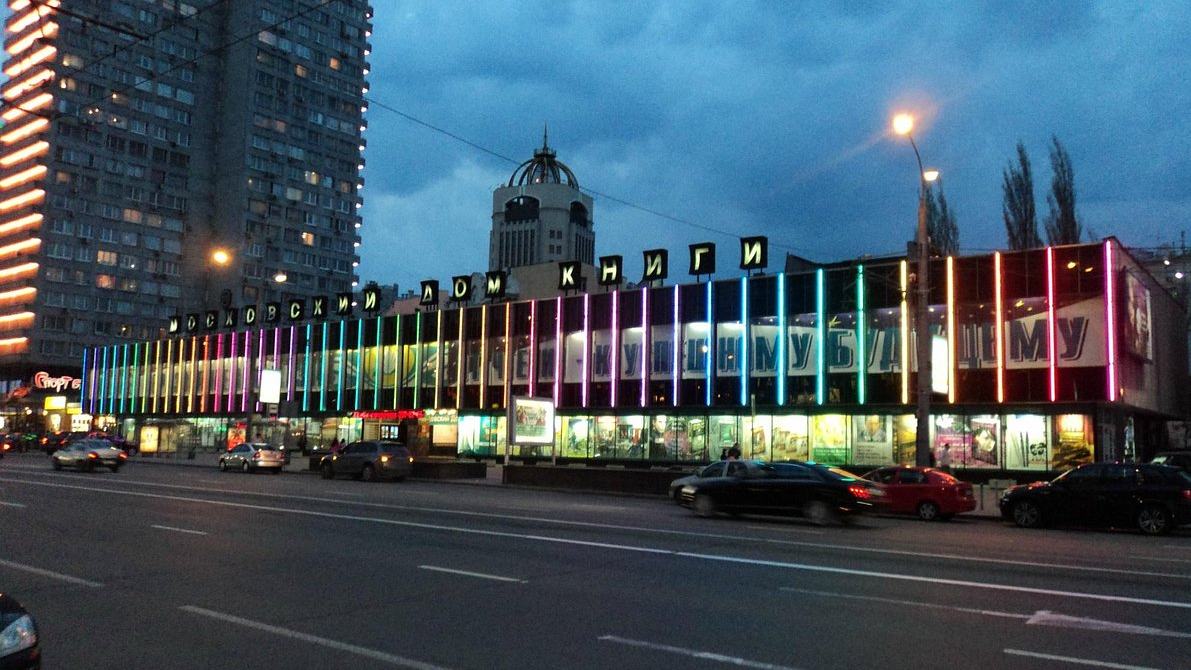
Russia’s largest publishing houses working in concert with the country’s libraries and book sellers formed an advisory union body earlier this month to address the increasingly repressive nature of laws centered around the subject matters of LGBTQ people and the war in Ukraine.
Making the task difficult is removal of materials from classic Russian literature in addition to contemporary works. Russian media outlet Vedomosti business daily reported that the Russian Book Union’s self-labeled expert center will issue recommendations on individual books, but leave the final decision to pull the books from sale up to the publishers.
According to Vedomosti, AST, one of Russia’s largest publishers, announced earlier this week that it would suspend sales of three books by U.S. authors James Baldwin and Michael Cunningham, as well as the Russian postmodern writer Vladimir Sorokin, for allegedly containing “LGBTQ propaganda,” which is now outlawed in the country.
Roberto Carnero, an Italian literature professor at the University of Bologna’s biographical who wrote a book on the openly gay Italian film director Pier Paolo Pasolini had been heavily edited with some 70 out of its 400 pages containing sections that were redacted by its Russian publisher, Reuters reported last week.
According to Carnero, speaking with the wire service, that publisher also AST, would only agree to publish his critical essay on Pasolini only with severe cuts.
“I am very concerned about this,” he said in a phone interview from Milan. “This is something that happens in dictatorships.”
The striking images of Carnero’s book have thrown a spotlight on issues of government censorship in Russia at a time when the Kremlin says it is fighting an existential war with the West to defend its “traditional values,” Reuters noted.
English language media outlet the Moscow Times reported that Russian law allows citations for scientific, educational, and critical purposes. If brought to court, Russian publishers would be forced to prove that they retold an unlicensed book for purposes that do not include entertainment.
Russian law firms say publishers risk being hit by lawsuits and fined double the value of books sold if their summaries hew too close to the original text.
LITHUANIA

A singer-songwriter who has been entertaining audiences since he was 12-years-old is now the first openly queer person to represent Lithuania at the Eurovision Song Contest this year.
Silvester Belthe in 2010 had been a finalist in Lithuania’s preselection for the Junior Eurovision Song Contest that year and now he returns 14 years later at age 26 taking the contest by storm.
A veteran of the musical variety contest show circuit, he competed on the Lithuanian version of the “X Factor,” and the Baltic TV3 Group’s music show “Aš – superhitas,” which he won in 2017.
PinkNewsUK reported Eurovision 2024 marks Belthe’s biggest career move to-date, and so far, it’s going well. His song, hypnotic eurobanger “Luktelk,” has hit over five million Spotify streams worldwide. In Lithuania, it hit number on the charts and stayed there for several weeks.
In an interview with PinkNewsUK when asked about LGBTQ representation in his homeland’s music scene. he responded: “Zero. It’s nada. It’s non-existent,” says Belt. “Everyone is pretending to be what they’re not, and it pisses me off so much.”
Eurovision has been supportive of LGBTQ musical artists for decades, but Lithuania has never sent an out artist to the contest. According to Belthe there is a culture of fear among Lithuanian artists about being seen as queer, as they feel there is “so much at stake” and that they could “lose [their] career” if they were to ever come out he noted.
The main reason he is frustrated by the lack of LGBTQ representation in his country he tells PinkNewsUK is that he thinks it would change the population’s mindset. Six in 10 Lithuanians still believe that same-sex relationships are “wrong.”
“If every single LGBTQ artist in Lithuania, not even artists, if everyone [would] come out, I feel like Lithuania would change in a day,” he says. “It’s just crazy that we have this massive elephant in the room and we’re just pretending it’s not there.”
UNITED KINGDOM
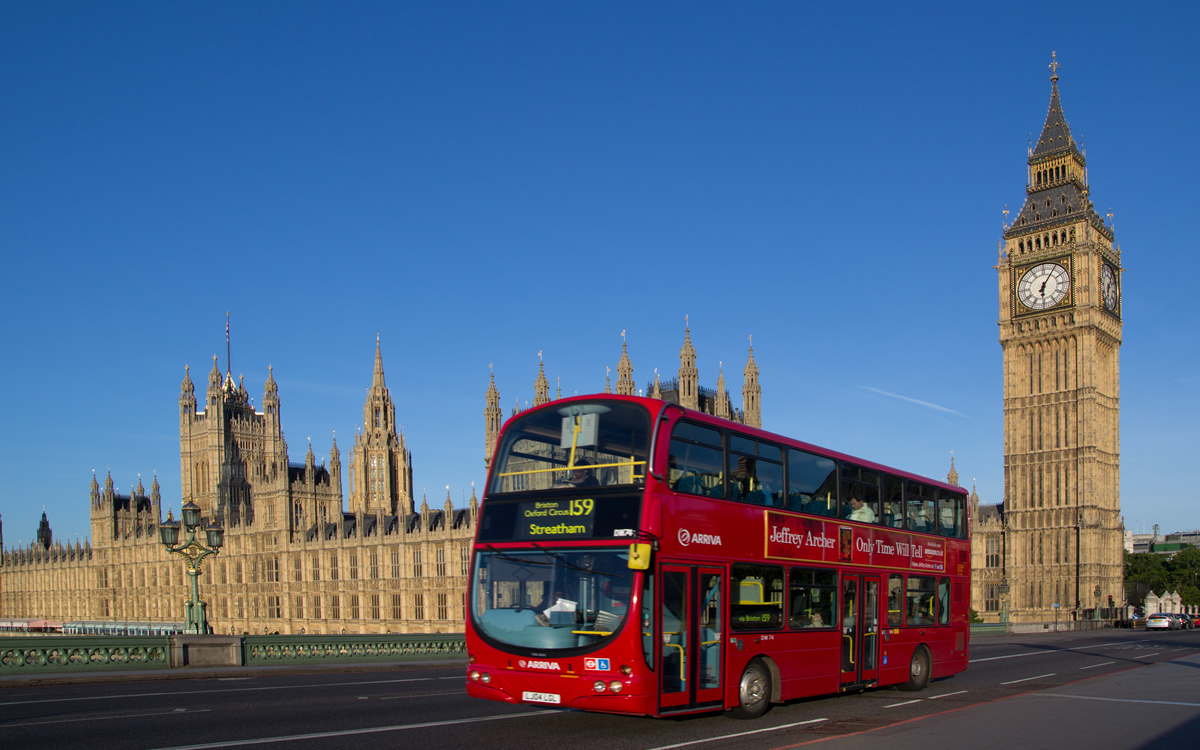
At the end of last month Deputy Foreign Secretary Andrew Mitchell announced sanctions on high profile Ugandan politicians charged with corruption, and the speaker of the Parliament of Uganda.
It is the first time the UK government has used the Global Anti-Corruption Sanctions regime on individuals involved in corruption in Uganda.
The three individuals, two of whom were previously ministers responsible for Uganda’s poorest region, Karamoja, and have been charged with corruption at Uganda’s Anti-Corruption Court, will be subject to travel bans and asset freezes.
The two former ministers sanctioned — Mary Goretti Kitutu and Agnes Nandutu — stole thousands of iron sheets used for roofing and infrastructure from a Ugandan government-funded project aimed at housing some of the most vulnerable communities in the region, providing them to prominent politicians and their families instead.
Parliament Speaker Anita Annet Among benefited from the proceeds.
Over 60 percent of people in Karamoja live in poverty and many suffer from the devastating impacts of drought and insecurity.
Mitchell said in a media statement:
“The actions of these individuals, in taking aid from those who need it most, and keeping the proceeds, is corruption at its worst and has no place in society. The Ugandan courts are rightly taking action to crack down on those politicians who seek to line their own pockets at their constituents’ expense.
Today the UK is sending a clear message to those who think benefiting at the expense of others is acceptable. Corruption has consequences and you will be held responsible,” Mitchell added.
The three individuals sanctioned were:
- Anita Annet Among, who has been the speaker of the Parliament of Uganda since 2022.
- Mary Goretti Kitutu, who was the Minister for Karamoja Affairs between 2021 and 2024.
- Agnes Nandutu, who was the State Minister for Karamoja Affairs between 2021 and 2024.
These measures follow previous UK sanctions under the Global Anti-Corruption sanctions regime, which has targeted individuals involved in serious corruption cases across the world, including Bulgaria, Lebanon, Moldova, Russia, South Africa, South Sudan, and Venezuela.
Since its introduction in April 2021, the UK has introduced sanctions on 42 individuals and entities under this regime globally to combat corruption across the world.
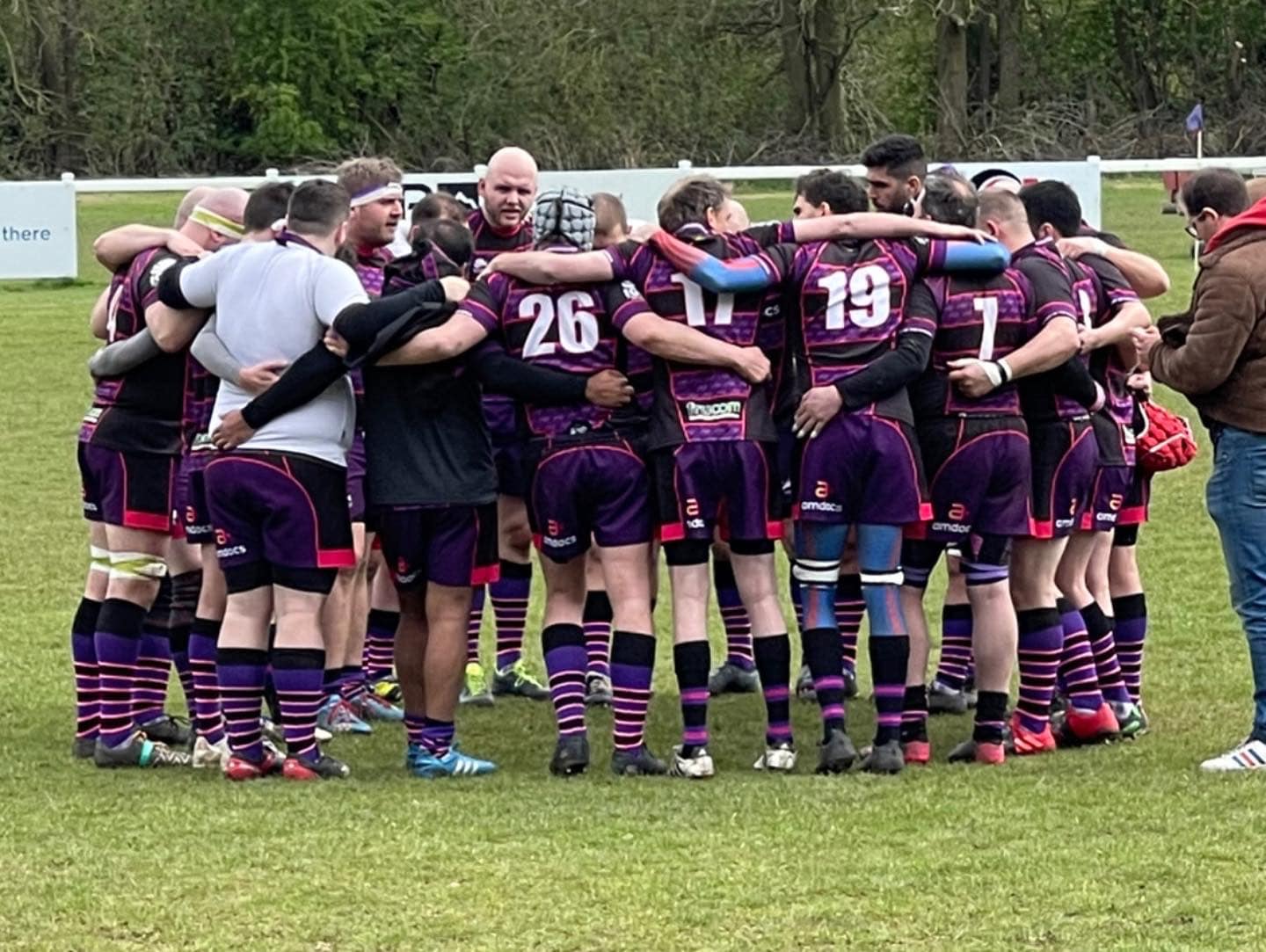
A fully inclusive rugby club, with the majority of their members being part of Berkshire’s LGBTQ community, competes against other inclusive teams from across the world.
Recently the club won the International Gay Rugby UK league for the first time in their seven year history. John Hamp, the tighthead prop, one of the three players who form the front row of the scrum, told the BBC that being part of an LGBTQ inclusive club meant “you don’t have to hide any part of yourself.”
“With any inclusive rugby team, the need is that there are people who really enjoy rugby and really enjoy the sport, but haven’t necessarily found their home in a traditional club setup,” Hamp said.
“We provide a home and a welcoming environment where anyone and everyone can come and learn the sport,” he added.
Hamp, who is also the teams’ communications manager, told the BBC an inclusive club meant “regardless of any of your defining features or characteristics, especially for us that includes a sexual orientation, you can join our club and find a safe and welcoming environment — somewhere that you can be yourself.”
“I have a rugby family, and I tried as a child, and it just didn’t feel right for me — I knew that I was a bit different, I think other people knew that I felt different, and it didn’t feel comfortable for me,” he said.
“Sadly my my father passed away and I needed to do something; I needed something different — there was a need to be with community that understood me and a connection that I wanted to get back involved in rugby.”
“So I found the unicorns, and it was the perfect marriage of those two things.”
The club was founded in 2016, and has grown in size to over 50 playing and social members. This season, the team went unbeaten, scoring over 400 points across their 11 games in the process.
NORTHERN IRELAND
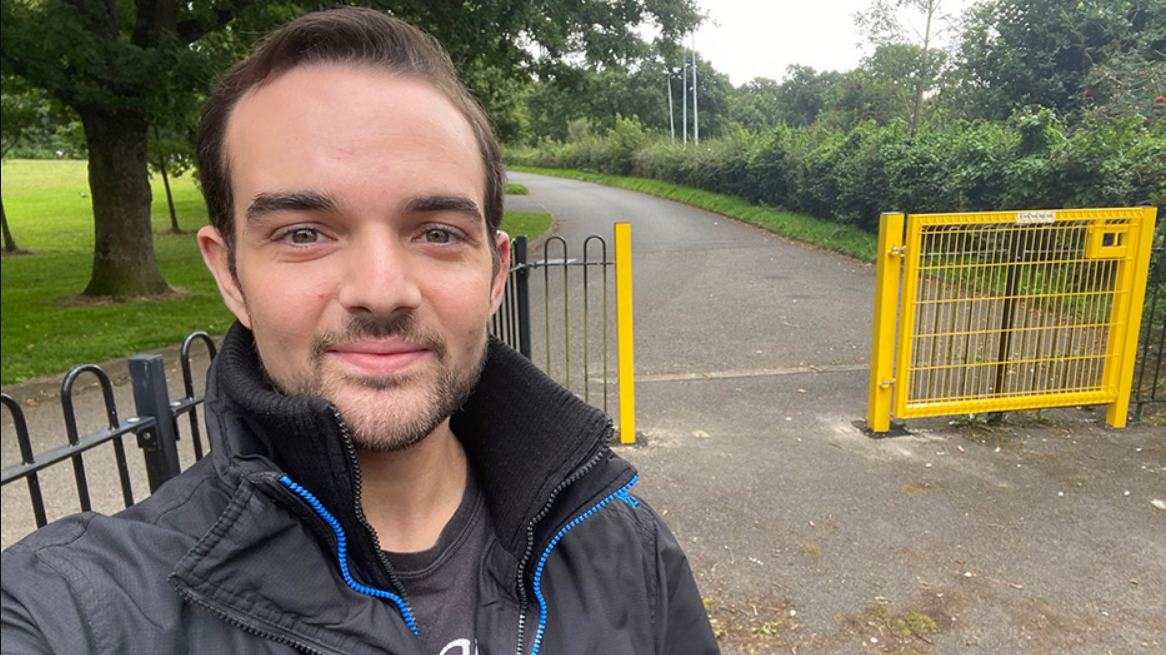
For the first time in the 132 history of the largely ceremonial role of Lord Mayor of Belfast, an openly gay man has been chosen. Micky Murray, an Alliance Party city councilman representing the Balmoral area, was selected to succeed the outgoing Sinn Féin’s Ryan Murphy in June.
On his X account Murray stated: “It’s truly an honor to have been selected by my party to be the next Lord Mayor of Belfast in June. This is a significant moment for the LGBTQ+ community, as I step into a role which has never represented us before. I look forward to getting stuck in!”
The 32-year-old politico in an interview with LGBTQ media outlet GCN Ireland said:
“In my role as Lord Mayor I want to meet people in all areas of Belfast and recognise those who are making a difference in every quarter, finding ways to work alongside them for the better.
He added: “Supporting the most vulnerable is a priority of mine, and I want to use my experience working in the homeless sector to ensure our city does more to help people.”
“I want to help transform Belfast into a more inclusive city where everyone can enjoy, regardless of who you are or where you’re from. We’re 26 years on from the Good Friday Agreement and we were promised peace, which has largely been delivered, but now is the time to further break down barriers and create a thriving city.
Our city should be recognized for its inclusivity, rather than its division. As the first openly gay Lord Mayor, I want to use this platform to represent the LGBTQ+ community and be a positive role model for them.”
In an interview with the Belfast Telegraph Murray said: “As a schoolboy who was badly bullied because of my sexuality, I never thought I’d have the privilege of serving in a role like this.”
The councilman continued: “The position of Lord Mayor has existed for over 130 years, and I’ll be the first openly LGBTQ person to hold it. It’s a huge honor for me personally to be given this opportunity by my party colleagues.
While some people may question why my sexuality is relevant, it does matter for members of my community. We are finally represented in a role we’ve never been before. It’s imbued with symbolism.”
IRELAND
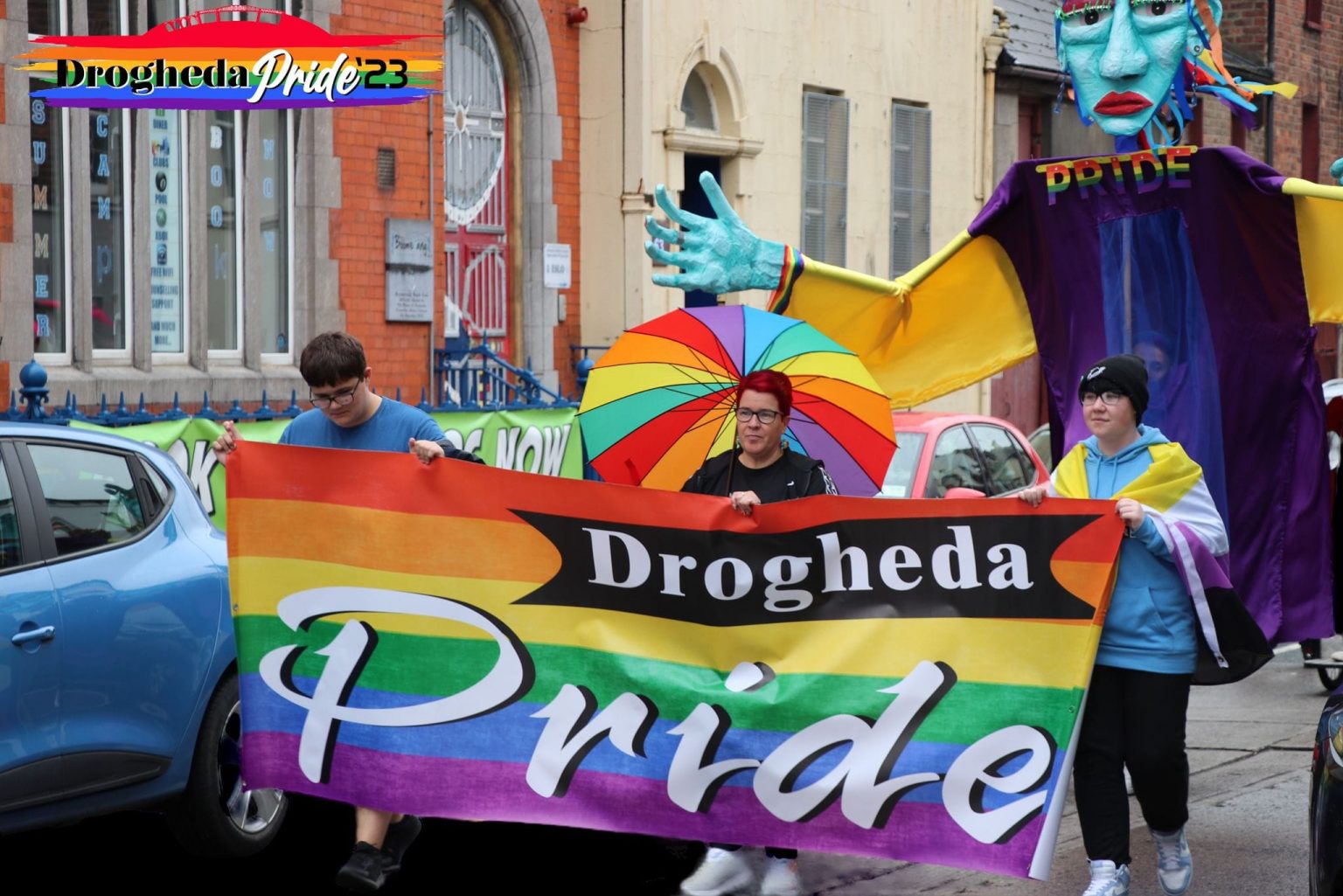
Pride is back again this year for Drogheda, an industrial and port town in County Louth on the east coast of Ireland, 26 miles north of Dublin. The four-day festival which kicks off on July 18, will include live musical performances, dance parties, film screenings, and family-friendly events.
This year’s event promises to be a fantastic experience, with preparation well underway and organizer Peter James Nugent told GCN Ireland. Nugent is working on the four-day festival, which will include live music performances, dance parties, film screenings, and family-friendly events.
This year’s parade will take place on July 20. Following the parade, talented local musical artist Kobrah Kage will headline the main event with a highly-anticipated performance.
GCN also reported that Festival organizers are also calling upon anyone with a talent, be it a drag queen, a singer, a dancer, or any other talent, to apply to be a part of the 2024 fantastic event. This is a great opportunity for the local community to showcase their support and join in the celebrations. A complete listing of events is available on Drogheda Pride’s socials and their website.
Additional reporting from the BBC, PinkNewsUK, The Moscow Times, Agence France-Presse the Belfast Telegraph, and GCN Ireland.
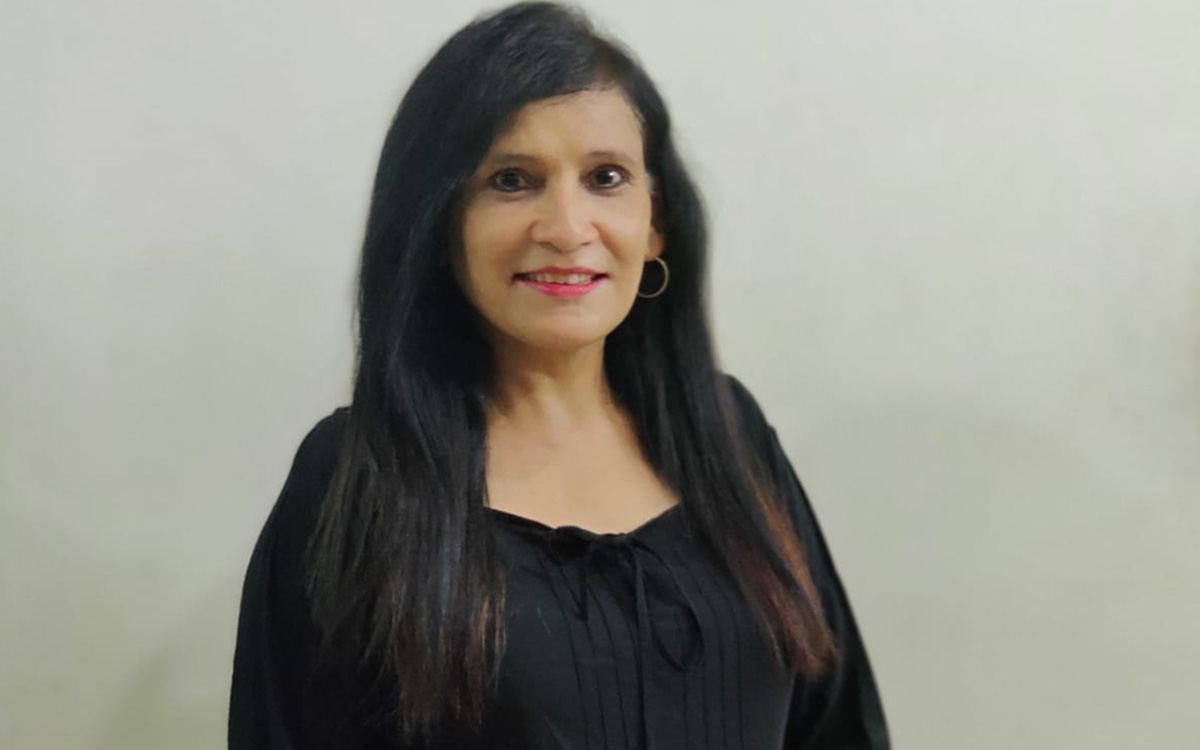
Amid heatwaves in the Indian capital of New Delhi, the world’s biggest election is raising the temperature even higher.
The temperature in the Indian capital on the morning of April 18 reached 107 degrees, and the sun blazed like a furnace. In the political corridors, however, the sweat wasn’t just from the heat, but from the fervent preparation for and in anticipation of the election results.
The Bharatiya Janata Party, the current ruling party, aggressively prepared for the 2024 general election months ago but the other regional and national parties still seem to be preparing while the election has started in the country.
The Washington Blade traveled to New Delhi and witnessed the political party’s campaign and preparations.
Home Minister Amit Shah, representing the BJP, was aggressively campaigning in Ahmedabad and Gandhinagar in Gujarat state. BJP National President Jagat Prakash Nadda was campaigning in Assam state.
The Blade interviewed Barkha Trehan, a political activist in New Delhi. She said that while various political parties in India address transgender and women’s issues in their campaign rhetoric, the Indian National Congress fails to translate its promises into action at the grassroots level.
“Political parties, especially the Congress party in the country, have talked and written enough in their election manifesto, but in last many years they have done nothing,” Barkha told the Blade. “In the last 10 years, we have seen that whatever Bharatiya Janata Party (BJP) says or has written in their election manifesto, we have seen that work done on the ground level. Let’s say it is a women’s issue or transgender community issue, or any other issues like infrastructure issues, everything is visible.”
Barkha said that discussing an issue and taking tangible action on it are distinct endeavors.
She emphasized the BJP’s efforts at the grassroots level, whether concerning trans issues or other matters, deserve recognition. The BJP, according to her, has undertaken numerous initiatives for the trans community that skill development programs and providing loans for startups.
“BJP wants to work for all without any discrimination,” Barkha told the Blade. “They want to create a good image of our country in the world, but the Congress party always pulls down the fame. They always go abroad and discredit the country by talking negative all the time. They think this is the only way to win election in India, but this won’t work out for them.”
Talking about trans issues, Barkha said Prime Minister Narendra Modi has met people from the trans community. She told the Blade that he is trying to motivate the trans community to take advantage of employment opportunities.
“Before Modi, nobody used to look at the transgender community,” said Barkha. “No one used to talk about them. When the prime minister’s video went viral on the internet and television while he had a conversation with the transgender community, other people started and felt inspired to work for the transgender community and talk to them.”
Barkha told the Blade these things send a message to the trans community that there are people who are listening and who will always stand by it.
She noted the trans community has always faced discrimination, neglect, and abuse in India. This political outreach, according to Barkha, sends a strong message that the trans community is as important as anyone else, they have the same value as any other citizens in the country, and they deserve a better life. She told the Blade trans people can make money when they can learn new skills, and they will have self-confidence and self-respect when they can earn a living.
Discrimination based on gender identity remains commonplace in India
India’s trans community has suffered discrimination for many years.
An openDemocracy report notes 80 percent of trans Indians are either engaged in sex work or begging. India in 2019 passed a law, Transgender Persons (Protection of Rights) Act, with aims to protect the rights of trans people, their welfare, and matters connected therewith and incidental thereto.
The Indian government and BJP in 2022 came up with a socialist scheme for trans people. Support for Marginalized Individuals for Livelihood and Enterprise is a program to support trans people who are engaged in begging. It provides them access to medical facilities, counseling, education, skill development, and economic linkages with the support of state governments and local urban bodies along with volunteer and community-based organizations.
The Congress in Telangana state was recently accused of disrespecting the trans community when Revanth Reddy, the Congress party’s sitting chief minister, sent anti-trans slurs that targeted the state’s opposition party.
The Blade reached out to the Congress party’s office in New Delhi, but it denied the interview request.
BJP’s position on LGBTQ issues questioned
The Blade while in New Delhi also visited the Aam Aadmi Party’s headquarters.
Despite the scorching sun overhead, Delhi residents sought refuge from the sweltering temperatures. The Blade, amid the election fervor and campaign hustle, interviewed Aam Aadmi Party spokesperson Preeti Sharma Menon. She said the BJP is regressive and seeks to intrude into a person’s bedroom, dietary choices, and other aspects of their personal lives.
“If BJP comes back to power, the party will keep doing what it is doing now, not supporting LGBTQ rights,” said Menon. “I think, there is no doubt in the LGBTQ community that one cannot have BJP in power and live safely. If we want to give equal rights to every citizen of this country, then only the Indian National Developmental Inclusive Alliance is the only chance.”
She said the Aam Aadmi Party always tries to give LGBTQ people a chance, but the party in this general election has few seats (in parliament) for which to fight because it is part of the opposition alliance.
“We always think if you want the change, the LGBTQ community must have a representation in the parliament,” said Menon. “So, we always try to make LGBTQ community in the country politically active.”
Ankush Kumar is a reporter who has covered many stories for Washington and Los Angeles Blades from Iran, India and Singapore. He recently reported for the Daily Beast. He can be reached at [email protected]. He is on Twitter at @mohitkopinion.

